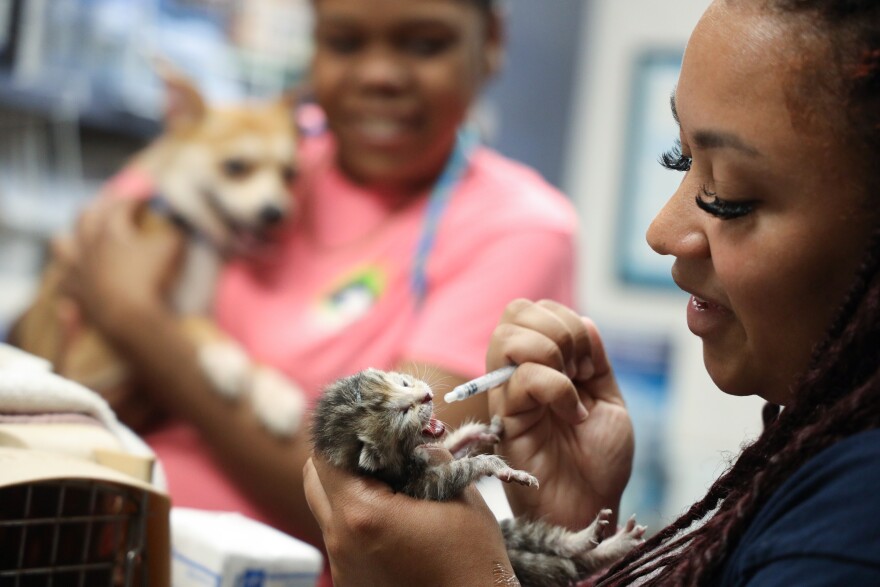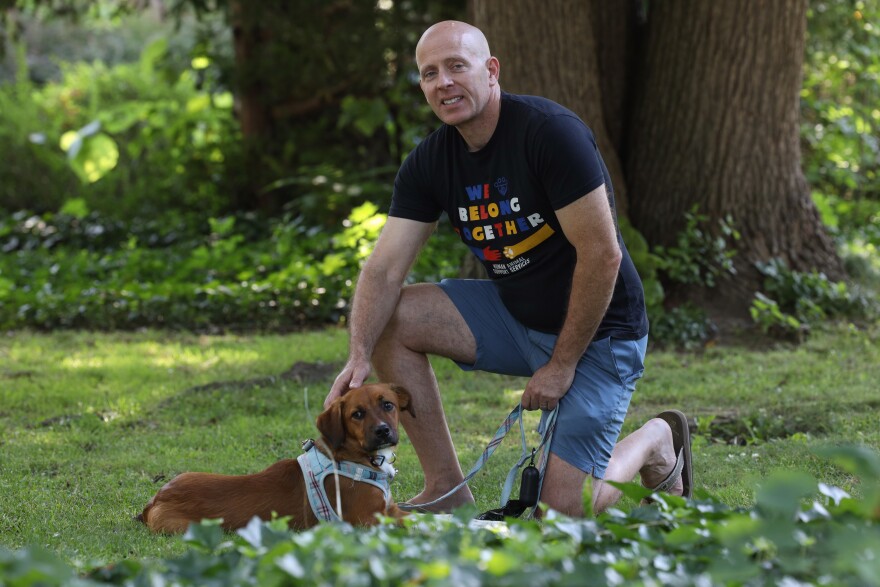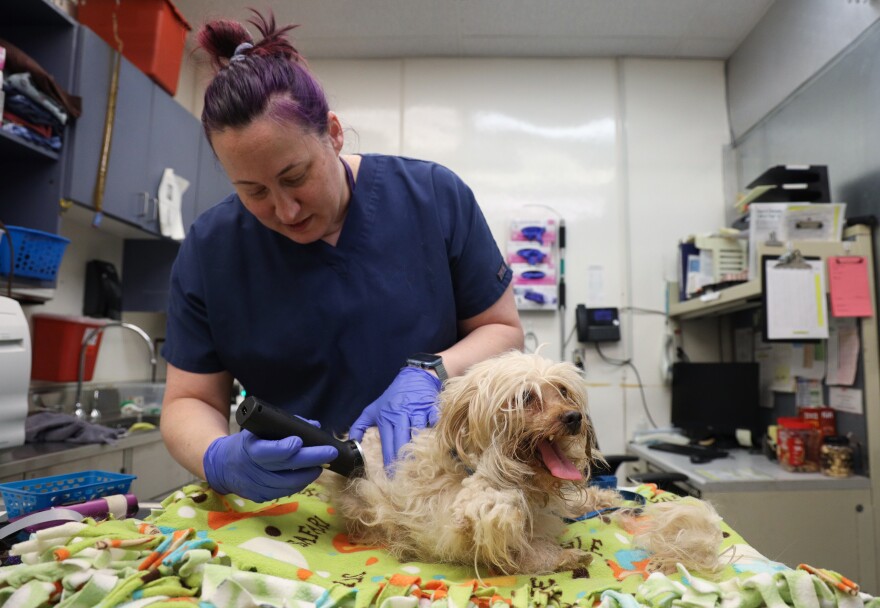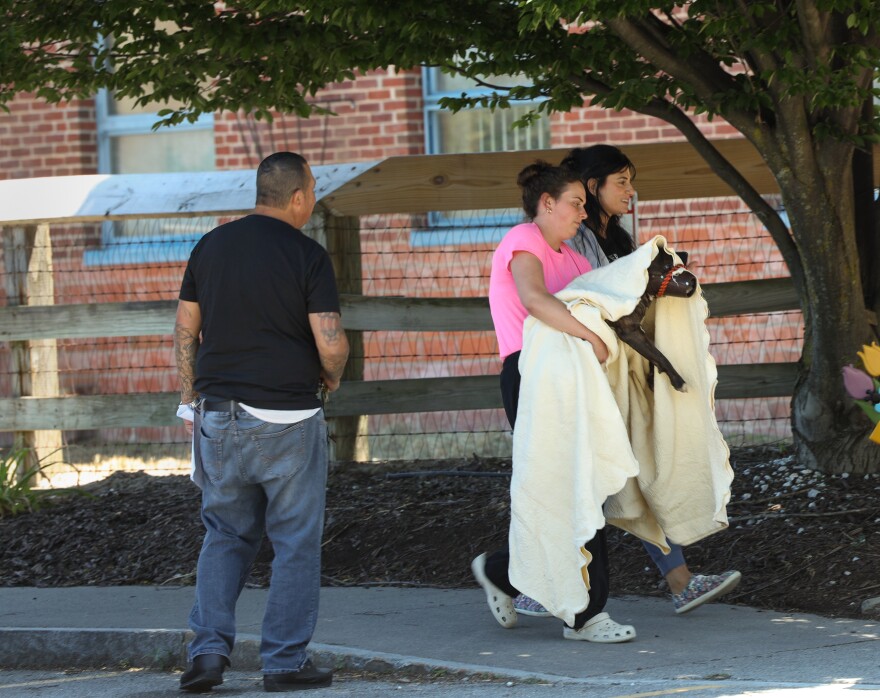A cacophony of barking dogs greets you inside Rochester’s Verona Street animal shelter.
Rows of narrow kennels are all occupied with large mixed breeds; pets who were surrendered or lost and found wandering the city.
In operation since 1998, the shelter has made headlines in recent months as a facility straining to meet demand; its shortcomings laid bare when a deadly viral outbreak killed 11 dogs.
Then came the resignations of its longtime director and its newly hired veterinarian.
“The facility is not equipped to handle these animals,” said Kristen Braitkrus, the veterinarian who left after nine months on the job.
The city has four vets on contract for the interim. And it expects to have a new director on board by the end of the month.

But there is increasing pressure from activists for Mayor Malik Evans and his administration to make substantial changes in shelter operations. And new state regulations are looming that will require significant investment but reduce shelter capacity — at a time when pet surrenders are again on the rise.
It’s a pivotal moment.
“There's a sense of urgency,” Evans told City Council members who pressed him recently about the path forward. “We discuss this every day.”
Those discussions are not just happening in the city, but also in towns across Monroe County as communities work to meet those new 2025 state standards.
A 2022 architect’s report put expansion costs for Verona Street at no less than $6.5 million, and priced a new Rochester shelter at more than $37 million.
“Whatever we do,” Evans said, “it is going to be an expensive proposition. Absolutely.”
‘Why is this so difficult?’
The shelter accepts dogs, cats and other animals. But dogs are the main clientele here.
A nondescript, one-story brick building, it sits at the northwest edge of downtown, a couple of blocks from Innovative Field. Evans likens the shelter to a house "when you don’t invest regularly.” And the city has not invested in the building for decades, he said.
While the facility regularly passes state inspection, officials say it is undersized, underfunded and outdated.
The city is making some improvements, updating the clinic area, improving security. And there is $1 million in the budget for things like redesigning the lobby and buying new kennels. The ones there now are original, from 25 years ago.

"What I would ask is to be patient with us,” said Shirley Green, commissioner of recreation and human services, the department overseeing animal services. “Work with us. Don’t beat us up.”
But patience is running out.
"I just feel like we've been doing this for so long. Why is this so difficult?” said Maggie Cain, who used to volunteer at the shelter and founded the nonprofit Voiceless of Verona Street three years ago.

She said she’s been badgering City Council members for years about a new shelter. Though opened as an animal shelter in 1998, the building itself dates to 1940.
“There's nowhere to isolate animals,” she said. “There's not good infection control in the operating room.”
The new state regulations require an isolation area, which was needed when an outbreak of the highly infectious Parvo virus turned deadly in December 2023. And the state changes are requiring those new kennels.
But this conversation is about more than bricks and mortar.
"If you don't have enough resources to staff the operation and find the supplies, the medications, the vaccinations, the diagnostic equipment — everything that goes into caring for animals that are in our care — then it doesn't matter what the facilities are like," said Chris Fitzgerald, the former longtime director of animal services.
'Animal work’
Fitzgerald resigned in February after being on medical leave since November. He had been in the position for almost 24 years.
A separation agreement referenced an employment dispute but stated his resignation was voluntary and awarded him $24,100 in “severance pay,” in addition to accrued vacation. The agreement came with a non-disparagement clause. In an interview, and after consulting with his lawyer, Fitzgerald declined to discuss the specifics behind his departure.

“My vision didn’t align with the administration,” he said, adding that “the challenging job became impossible at some point, and I started to feel the effects personally and physically."
Braitkrus left to go work at Lollypop Farm.
Rochester used to contract for animal services with Lollypop Farm, the Humane Society of Greater Rochester. That agreement ended about a year after the Verona Street shelter opened in 1998.

"It was costing Lollypop Farm more money to run it in the fashion we deemed necessary than the city was willing to reimburse in a contract," said Lollypop President and CEO Alice Calabrese.
Fitzgerald said this continued to be the city’s mindset.
"It's always kind of been viewed as something that is like animal work,” he said. “It's not to the level of significance as people work."
Yet even without a formal agreement, Lollypop still works with Rochester — as it does the surrounding towns. Calabrese sees the future of animal welfare as a collaboration, given the duplication of efforts that exist between humane societies as well as the community shelters.
'A financial burden’
The town of Chili just spent nearly $400,000 on a new dog shelter that opened this spring. Greece is spending $1.5 million to build one. And Webster is considering building one as well.
Meanwhile, the town of Irondequoit spent $50,000 in federal pandemic relief funds, upgrading its shelter to meet updated New York state standards.
“Then hopefully, next year, we'll be able to, you know, put money in the budget to be able to cross the finish line, so to speak — as long as it doesn't move,” said Irondequoit Police Chief Scott Peters.
He echoes Calabrese.

“Every town and every municipality in Monroe County has to come into line with all these new mandates,” he said. “So it's been definitely a financial burden.”
Many of the surrounding counties have a county-run facility or contract with the local humane society. Here, Peters said, “every town has to fend for themselves,” duplicating efforts and expenses — in facilities, equipment, staffing — while facing similar challenges in funding and capacity.
“It is ridiculous,” said Chili Town Supervisor David Dunning.
He tried for two years to get Monroe County to take over, or multiple towns to form a district and share expenses.
Animal control services and the broader concept of a centralized dog shelter was part of Monroe County’s Shared Services Plan in recent years. But that is only feasible is all town agree, said county spokesman Gary Walker. "Not all towns wanted the county to take over this function, but we continue to be willing partners if the towns come to an agreement.”

“I gave up,” Dunning said.
Henrietta town Supervisor Steve Schultz is still trying. He recently reached out to Rush, Wheatland and Brighton about a shared facility, he said. Brighton, though, recently built its own.
Towns differ in their approach, some doing just dog control, some addressing other critters. Finding a central location is also a factor.
In Greece, the new shelter is being built behind a police precinct on Maiden Lane, where Animal Control Officer Rich Wood and his colleagues are based.
The town had an agreement with Stone Ridge Veterinary Hospital to provide shelter services, but the operator decided this year not to renew the agreement. The hospital is two miles away, and is run by Thrive Pet Healthcare. Thrive also closed an emergency vet clinic last year in Brighton.
So for now, Greece has temporary use of Chili’s old shelter — which involves a half-hour drive for Wood, who at times is the lone animal control officer on duty.
There is urgency here.
“I wouldn’t say there's been a tremendous increase (in animals taken in),” Wood said. “However, numbers are high. Our rescue groups have been really struggling to keep up with fostering. So, I mean, there definitely is a huge demand on the system, for sure.”
State funding is available to help offset capital expenses for these shelters. The town of Webster received $400,000 for kennels and other improvements this year. Lollypop Farm, and shelters in Orleans, Wayne, and Wyoming counties have previously received grants.
Rochester has applied but received nothing through six rounds of funding awards.

‘A challenge for decades’
How society views and cares for its animals, particularly pets, has changed dramatically.
Twenty years ago, more dogs and cats were being euthanized at the Verona Street shelter than were being reclaimed, adopted or transferred, records show. One of the biggest barriers then was the perception that Verona Street was not an appealing place to find a pet.
"There were a lot of misconceptions about a city pound, the types of animals you would get,” said Jennifer Brown, who founded the nonprofit Verona Street Animal Society in 2005 to help with fundraising and promotions.
“Dark, dingy, depressing. ‘We don't want to go there,' was a commonly held perception,” she said — or that people had no knowledge of the facility at all.

Over the years, she said, the nonprofit has partnered with Rochester Animal Services on programs that have helped the shelter evolve. This includes improved marketing, partnerships with local rescue groups and enrichment programs for shelter pets. About 10 years ago, they helped install a play yard, adjacent to the shelter.
"Which has greatly improved outcomes for dogs, because they're able to get out and socialize and be assessed behaviorally outside of the shelter environment, which customarily is very stressful for animals,” Brown explained.
That affects outcomes, because pets have become more integrated into people’s lifestyles and families. Which also is seen in shelters increasing focus on keeping pets with people, not in kennels.
“Animal sheltering is a community thing,” Calabrese said.
Rochester has relied on fostering to address crowding. And it has recorded a dramatic upswing in reuniting or adopting pets — pushing its live release rate from below 50% to as high as 91% over the past decade. That since has fallen back to 86%.
And the number of dogs and cats being euthanized has plummeted.
The city expects to spend $2.1 million on animal services in the current budget. That’s slightly higher than past years. The budget has been relatively flat for a decade.

But while it’s clear to many that more investment is needed, where to take that money from is the challenge — particularly in a community with so many needs and competing priorities.
“For me, every option is on the table as it relates to animal services,” the mayor said. “Animal services has been a challenge for us for decades.”
The operation has been shifted between police and now the recreation and human services department. Fitzgerald said he thought it should be elevated to its own department.
Evans offered another option.
“I've been clear ... about us being careful what we're in the business of,” Evans said, speaking to City Council about future investments. “Long term, should the city be in the in the animal services business? That's another conversation that we can have — eventually.”
Includes reporting by investigations and enterprise editor Brian Sharp.




